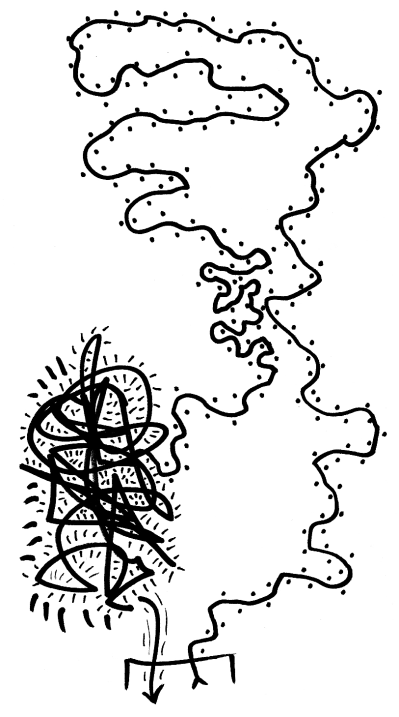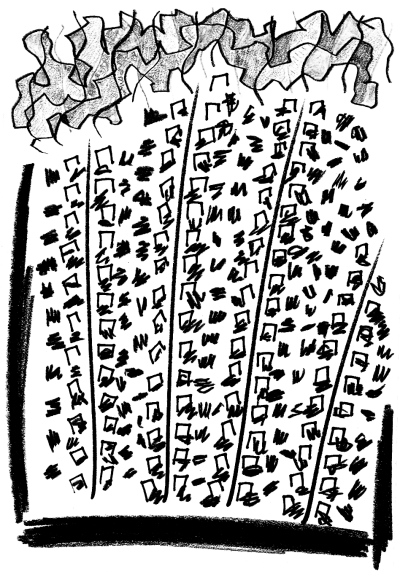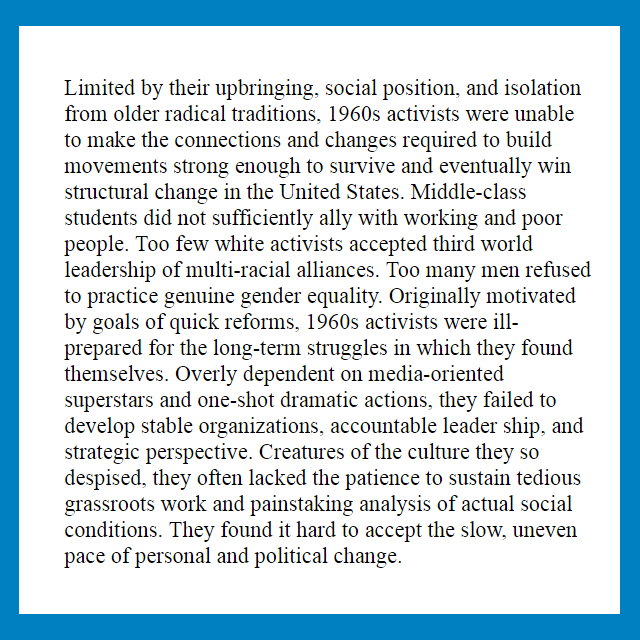 I dreamed one night of desert and flood. I dreamed that I lived in a city up on a hill in the midst of an enormous desert that stretched out for miles on all sides. All I could see when I looked beyond the city, was sand, dotted here and there by the woeful skeletons of dead trees.
I dreamed one night of desert and flood. I dreamed that I lived in a city up on a hill in the midst of an enormous desert that stretched out for miles on all sides. All I could see when I looked beyond the city, was sand, dotted here and there by the woeful skeletons of dead trees.
In my dream, I set out on a business trip that would take me on foot across the desert to another city. I had to attend a vital meeting, and I undertook my journey with intense purpose. It wore my best business suit, had an expensive attaché case in hand, and I looked every bit the part of a successful, influential businesswoman.
As I walked, I was surrounded by hundreds of fellow travelers who were complete strangers. Some walked, some rode horses or donkeys, but all were on congenial terms. We talked, we gossiped, we traded jokes and stories, a gregarious gaggle of business travelers. We’d heard a rumor that rain was coming, but none of us took it that seriously. We discussed it amongst ourselves, but none of us knew for sure if the rain would come.
Two days into our trek, a rider on horseback joined our throng from the city we had left. He said a big rain was indeed coming, and we’d have to turn back now, if we wanted to make it back home safely. Some turned back, but others of us kept on. I continued, unconcerned by the natural threat. After all, I had business to attend to.
Before long, rain started to fall. Gently, at first, then coming down harder, it doused us and caused more of my fellow travelers to turn back. In two’s and three’s, they decided to postpone their plans and trickled back home.
Soon, I was the only one en route to my destination across the desert. When I looked behind me, I could see a steady stream of travelers surging back to the city. I thought they were all being alarmist — they must not have important business to attend to. At least, not as important as mine.
I, for one, was not to be deterred. I’d set out on this journey with good reason, and no rain or wind would stop me. I was crossing this desert on business, and I meant business. But the rain didn’t care. It poured down on me in a hail of wet bullets, and the desert that hadn’t seen rain for months began to fill up like a lake.
Gradually, the water level rose to my waist, and I thought perhaps I should seek shelter. But the city was too far behind me to reach now. The water would get too deep to ford on foot before I was halfway there. I was getting tired, slogging through the wind and water, and I looked around for help.
About a mile off in the distance, I spotted a large tree. Dead, with no leaves and only a few branches, it reached some 50 feet into the air — salvation. I splashed towards it, and when I reached its trunk, I clambered into the branches and sat there, looking around me in disgust. I had my best, most expensive business clothes on, and they were well on their way to ruin. I was undoubtedly going to miss my meeting. I nestled back into the crotch of the tree and wondered how long it would take till I could be on my way again.
Days passed.
The rain continued to fall and the waterline rose.
I was forced to climb up to the farthest ends of the branches, as water lapped at my feet. But farther up the tree, there was no crook to sit in, and the bark was too slippery from rain to let me sit astride a branch. So I had to hang. I threw both arms and legs around the highest branch above the water and held on for dear life.
For three weeks, I dangled from that single branch, clutching it with my arms and legs above the rising water surface. Soon, there was barely a two-foot space between the water and the branch I clung to. I knew that if I loosened my grip, the wind would tear me away from my safety, and the boiling sea would swallow me. If I let myself do anything but clutch the limb tightly between my arms and legs, I was lost.
And so I hung there. Suspended above a roiling sea peppered with pellets of incessant rain. My arms and legs, unaccustomed to such strain, cramped and creaked and complained. Every few hours, I adjusted my position a little. Shifting my weight, I’d stretch out whichever arm or leg was failing and flex it, extend, flex, until the cramps disappeared or at least subsided.
And I did not sleep. The sun rose and set (I thought) behind the ashen-clouded sky, but I gave up counting how many times after the fifth day or so. At the start of my trial, I’d thought my exile would last a day or two at the most. How long could this rain keep up? But when that day or two (and then a week) came and went with no signs of the rain subsiding, I quit counting the hours and days. My only thoughts were of survival.
Fearing I’d fall asleep and plunge to my death by drowning, I stayed awake out of sheer will power. I ran thoughts deliberately through my head — every thought, new or old, I could muster — turning them over in my head, processing, processing, processing… When tired, I dwelled on episodes that had once enraged me, my anger jolting me awake. When anxious, I dwelled on scenes that had once comforted me. And when weak and despairing, I dwelled on simple pleasures I’d once known, and those memories refreshed me.
I came up with a hundred answers to every question that entered my semi-conscious mind, and still found room for more. I rehashed every love, every hate, every fight, every resolution, I’d ever experienced, and then granted them new consequences, new conclusions, both ideal and horrific. I lived my life over, a thousand times in review, making the “could have been’s” realities in that world of the inconceivable. No stone was left unturned in my mind, and I laughed, cried, swore and blessed, like a maniac. If anyone had seen me then, they’d have thought me mad — unless they’d considered my circumstances. Then they would have seen how sane I really was.
For weeks on end, aching and exhausted, I was the sanest I’d ever been. My fine clothes were rags hanging limp off my lean and wiry frame. My hair hung in greasy strands, streaming with rainwater. All there was, was me, my demons, my angels. There was no pressing business, there were no professional obligations. I was alone with my soul for the first time in my life, and as frightening or dismaying that acquaintance was at times, it was clean and pure and genuine. I had no pretenses left, no illusions, no preconceptions. And when I looked at the sea below me, I saw my reflection clearly in the rain-pocked surface. At times, I wished the flood would continue forever, that I could remain there until eternity, lost in my short life and dead to everyone but my very alive self.
But that was not to be. After weeks of seemingly endless rain, the clouds suddenly receded and burned away under the emerging sun. The golden disc cleared all clouds from the heavens and beat down on me with terrifying intensity. My clothes, soaked for weeks and disintegrating, dried within an hour, and my body began to parch. While it was raining, I’d been able to open my mouth for a few minutes, and I’d had a drink in no time. But suddenly there was no fresh water cascading down, only brackish soup beneath me.
I was seized with fear. What would happen, if I drank the water below me? I’d surely become ill, my guts boiling and shriveling with disease as I hung there, helpless, at the mercy of the sun.
For a day, I refused to try it.
Then unbearable thirst set in. I was faced with the choice between the possibility of dying by the act of my own hand or the certainty of death by the inactivity of my own hand. I envisioned a search party finding my body in the tree, when the waters had been entirely sucked back into earth and sky, just a skeleton dried and shrunken, disparaged even by vultures. Dead from thirst, while water had sizzled and boiled under the sun, all around me. “Silly girl,” they’d say, and then break my arms and legs to get me down from that tree. Or they’d simply let me hang there in the wind as a lesson to any who would pass that way again without heeding weather warnings.
With that, I reached down to the water, dipped in my cupped hand, and quenched my thirst. Splashing water onto my dried and cracking skin, I had no hopes in mind, no prayers on my lips to save me from my potential destruction. Either way, I might be dead, but if I was going to die, I’d rather it be by my own hand, than out of reluctance to take a risk.
Yet the dreaded sickness never set in. Although brackish and stale-smelling, the water did not make me ill. Each day, I drank and bathed as much as I pleased. And each day I had to reach lower to get to the water. The sun was evaporating the sea as quickly as the sky had unleashed it on the land. When I couldn’t hang from my arms and legs and reach the water, I swung both legs parallel and hung from my knees to reach the water. Back and forth I swung on that tree, as I’d done so many times as a child in other trees. I swung by my arms, too — by two, even one. My limbs had grown tough and strong from weeks of dangling, but I didn’t fully realize it until I began to stretch them out. Then, encouraged by the new power I felt in my muscles, I ventured back and forth along the limb I’d clung to for so long, exploring the limited range of that extension of my own self.
The lower the water level sank, the more branches of the tree were freed from its grasp. But the branches that emerged were soft and rotted, so I broke them off the trunk with mighty kicks of my legs. They fell into the brine and sank, and I wondered how the trunk itself had fared. It was spongy on the surface, but it still held. It gave slightly with the high, blistering winds that raked the desert/sea’s surface, but it held.
The last week in that tree, I played.
I swung and dangled and danced on the wind, feeling my muscles strengthen even more with my activity. Many times, I became overtired and my whole body ached, but this was nothing new. After weeks of this, I had become so accustomed to weariness and pain, I actually felt more comfortable when it set in.
I thought back on the rain-time, then, and rehashed all my thoughts of that time in a new light. I reworded my dreams into lyrics and composed for them tuneless ditties. I howled with dissonant music, relishing the muted effect the water gave my songs — especially when leaned down to scoop water into my singing mouth, onto my dancing body. I knew no time — only play and song. The nights were not nights; they were light variations in my perpetual day. I felt no hunger — it had long since left my life. I was lean and solid, alone and happier than I’d ever been.
I wondered in passing, now and then, what my old friends and colleagues in the city were up to. Had they weathered the storm well? Were they even still alive?
For some reason, I didn’t care. It made not a bit of difference to me. All I cared about, in that grand, rippling expanse, was myself, the tree, the sun and the ever-diminishing waterline. Whether anyone else lived or not was inconsequential. Whether the water would poison me or not, was of equal lack of concern to me. All there was, was my thin, hard-as-rock body, my songs, my thoughts, my perpetual day. My profession was non-existent, my business dealings didn’t hold my attention anymore. Sleep was a memory. There was nothing left of my old life or ways. No God in heaven, no world around me, no wrath of missed appointments, no ambitious hopes for greater power or prestige.
All of that was a distant memory; it no longer existed for me. And I did not think of going back to the city I’d left what seemed like an eternity ago. Nor did I plan to continue my trip to the city I was bound for when the rains had started.
But the sun continued to blaze, and the ground swallowed the sea around me. And soon, from my lofty perch I could see the sand of the desert floor glistening beneath the water. The sea had become clear, as there was nothing left to rot into it — not even debris from this tree.
Then one night, as I was singing and swinging on my branch, I caught sight of a glow on the horizon. It was the city I’d set out from. My old home. It had to be. On an impulse, I let go of the branch for the first time in nearly a month and dropped earthward.
I gasped at the shock of cool water, and then felt the solid thump of the sandy bottom against my back. The sea around me was again at waist level, and I stood on shaky legs for what seemed like the first time ever. I turned and looked towards the horizon — sure enough, the glow was still visible from the ground, if dimmer.
With strong strokes of my arms and less sure strides, I made my way through the waist-deep water towards that light — curious, and at the same time cursing myself for having left my perch and everything that had become the microcosmic world to me. Almost in spite of myself, and without knowing just why, I rushed toward the light, wondering how that city could still be standing after this greedy flood.
I reached the city gates sooner than I’d expected to. The city was on a hill, high above the waterline, and the ground leading up to it was as solid as ever. Two days after I’d dropped from my tree, I marched to the armed guards stationed at the main gate, dripping, clad only in rags, and demanded entrance.
At first the soldiers didn’t know what to make of me. They hadn’t expected anyone to return from that flood. No one was expected to survive it. But I had.
A friend of mine, who was from a prominent family in the city, appeared and ordered the guards to let me in. Then she took me to her family’s home for a bath, clean clothes and a hot dinner. But something else about her house appealed to me even more. Her father was a well-respected cleric in the city, and I was eager to talk to him — to share what I’d learned in my travails, my initiation, with an educated intellectual. He, of all people, I thought, would understand the transformation I’d experienced.
I bathed, put on clean clothes, and had dinner with my friend’s family. Everyone was talkative and wanted to know all about my adventure. Her father, however, was silent, distracted throughout the meal, and disappeared into his study shortly after the main course was served. I didn’t want to be rude to my friend, so I stayed and ate with them — but all the while I was distracted, too, thinking about how I could excuse myself politely and go talk to the cleric.
The others at the table (my friend, her mother, her younger siblings, even the servants) all wanted to know about my experience and were genuinely interested. But I resented the constant questions and kept my answers superficial and evasive. I wanted to save the heavier details for the real expert in the family who made his living off knowing about spiritual and theological things. I had seen some semblance of God in that tree out there. I had come to know deep and mysterious things. What could these simple, uneducated folks around the table know about such matters? I’d just returned from a vision quest, and I wanted to speak to a decidedly spiritual person about my revelations. That person, I thought, was the father, the priest.
When dinner was over, I excused myself abruptly and went to find the priest in his study. His office was a complete library — the walls were covered with bookshelves filled with ancient, pungent, hardbound books, their spines bearing cryptic titles in esoteric alphabets. In the center of the room stood his desk, a huge mahogany intellectual battleship, covered with parchments, books, and an assortment of lamps and writing utensils.
I sat down eagerly in a chair in front of his desk, waiting to get his attention. He didn’t seem particularly eager to speak with me, though, and only reluctantly did he put aside the huge tome he was studying. Sallow, with dark features, he exuded the self-consciousness that most of the prevailing theological ideas of the day were his handiwork. He looked at me without much curiosity, then assumed a ministerial attitude. “You wanted to speak to me?” he said in a superior but conciliatory tone.
I said I did, and proceeded to tell him about my experience in the tree. I recounted what I hadn’t told his family around the dinner table — the deeper things, the thoughts, the feelings, all that had taken place within me, while I’d been suspended from that tree. He sat quietly through my account, as I revealed all the details of my involuntary quest, and I prayed silently that he and I could discuss in-depth the mystical ramifications of my last three weeks.
But when he responded at the end of my tale, it was with theology, not mysticism. He cited chapters and verses of different holy texts he thought applied to my experience. He went to his bookshelves, took out aged volumes, and cross-referenced them with other writings scattered across his desk. He analyzed and reduced my initiatory time to a handful of theological abstractions. And as I sat there, I lost track of what he was saying — I could only watch his mouth move. I could only nod, as he launched into unfathomable intellectual intricacies about my account. He hadn’t been there, he hadn’t lived any of this. He’d been here, safe at home in this musty library, his nose buried in books, taking notes, while I’d been out wrestling with my demons. Notwithstanding, he supplied me with a completely one-sided analysis of my experience, not once allowing me to interject, but demanding with posture, tone and looks, that I sit still and take in his theoretical pronouncements.
The longer he spoke, the more my heart fell. I had hoped to connect with a contemporary who could understand the esoteric intricacies of my time, but I’d found nothing more than an intellectual power-over scenario, wherein I was anything but an equal in his eyes. Held hostage by his attitude, a guest in his home, I simply stopped listing to him and reminded myself that I’d had the experience, and I could trust my own interpretation of it, regardless of what he said or thought about it. I might not have been intimately versed in the intricacies of theological postulation, I might not have even had the right words to articulate my experience. But I knew what I had gone through, I knew what I had learned on a deep and profound level, and no amount of fancy cerebral footwork could take that from me. Maybe this priest had the vocabulary and formal training sufficient to dissect my initiation, but I was the one who had been the initiate.
In the end, I was the ultimate authority on the interpretation of my initiation.
At long last, he finished. And with a self-satisfied smile, he rose, clapped me on the shoulder, and saw me to the door. Then he locked the door behind me, and there was… silence.
I returned to the company of the others, disgruntled. They tried to bring me back into the conversation, but I was distracted by my disappointment and could only answer their eager questions with one- or two-syllable words.
I should have stayed there at the dinner table and talked to them all along, I thought. As simple as their understanding of my adventure seemed to me, it was nevertheless genuine, honest, sincere. And they were interested in hearing it from me, not from a parchment or theological “expert”.
Shaking the last hour in the study from my head, I turned my attention back to my true hosts. We talked with gusto late into the night.







 I dreamed I lived in a small city in mid-1930s Germany, and the Nazi party was on the rise. Inflation was high, as was unemployment, and all around people were becoming more and more uncertain about their futures. I was a young woman in this dream — a young lesbian in a waning relationship — and the circumstances around me seemed to mirror the decay of my own connection. There was general discontent, fear, and anxiety about the precariousness of everyday life. No one had enough to eat, and everyone was looking for something certain to hang onto. The Nazis sensed this and members were pasting their party posters and placards everywhere people could see.
I dreamed I lived in a small city in mid-1930s Germany, and the Nazi party was on the rise. Inflation was high, as was unemployment, and all around people were becoming more and more uncertain about their futures. I was a young woman in this dream — a young lesbian in a waning relationship — and the circumstances around me seemed to mirror the decay of my own connection. There was general discontent, fear, and anxiety about the precariousness of everyday life. No one had enough to eat, and everyone was looking for something certain to hang onto. The Nazis sensed this and members were pasting their party posters and placards everywhere people could see. I dreamed that some leaders in the women’s community where I lived wanted to form a women’s protection network, consisting of some of the most prominent members of their group. Women were being attacked almost nightly in the area, and they wanted to put together a night-watch and prayer-circle network. Their plan was to have a group of choice women to get together in groups of two or three, patrol the areas around endangered women’s homes, watching for intruders and praying for protection. Two of these founding women were my friends — one was a big, gentle, soft-spoken woman from a rough, working-class background, and the other was a slight, intellectual woman from an upper-middle-class family. The third was a local leader in the women’s spiritual community, who led many ceremonies in the area.
I dreamed that some leaders in the women’s community where I lived wanted to form a women’s protection network, consisting of some of the most prominent members of their group. Women were being attacked almost nightly in the area, and they wanted to put together a night-watch and prayer-circle network. Their plan was to have a group of choice women to get together in groups of two or three, patrol the areas around endangered women’s homes, watching for intruders and praying for protection. Two of these founding women were my friends — one was a big, gentle, soft-spoken woman from a rough, working-class background, and the other was a slight, intellectual woman from an upper-middle-class family. The third was a local leader in the women’s spiritual community, who led many ceremonies in the area. I dreamed one night of desert and flood. I dreamed that I lived in a city up on a hill in the midst of an enormous desert that stretched out for miles on all sides. All I could see when I looked beyond the city, was sand, dotted here and there by the woeful skeletons of dead trees.
I dreamed one night of desert and flood. I dreamed that I lived in a city up on a hill in the midst of an enormous desert that stretched out for miles on all sides. All I could see when I looked beyond the city, was sand, dotted here and there by the woeful skeletons of dead trees.